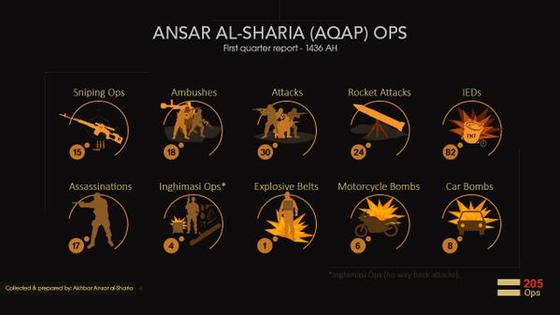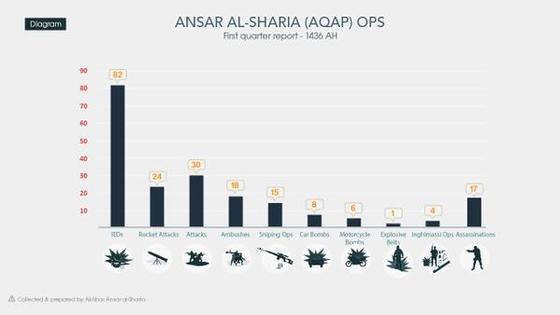A Twitter account affiliated with al Qaeda in the Arabian Peninsula (AQAP) has released two infographics detailing the terror group’s activity for the first quarter of 1436, the current year according to the Islamic or Hijri calendar. Being that the current Islamic year began on October 25, 2014, these infographics purportedly represent terrorist attacks carried out by AQAP in the three months since.
The two infographics (shown below), and the accompanying report produced by AQAP, indicate that the group has claimed credit for a total of 205 attacks in the three months since the beginning of the current Islamic year.
AQAP includes the terrorist shooting at Charlie Hebdo’s offices in Paris on January 7 as one of its 205 attacks. AQAP refers to the massacre as “the Paris raid.” A senior AQAP official previously claimed responsibility for the Charlie Hebdo assault on behalf of the organization.
The two infographics categorize the types of terrorist operations into ten different types, including ambushes, sniper shootings, and attacks involving suicide belts. Based on the data presented by AQAP, the terrorist group has relied most heavily on the use of improvised explosive devices (IEDs) in the past three months.
Additionally, AQAP’s report points out that the Houthi rebels have been the group’s primary target, followed by the Yemeni military, and then American and French interests in Yemen.
AQAP’s resolve and capabilities have recently been questioned in some jihadist circles due to the advances of the Shi’ite Houthi rebels inside Yemen. Since their seizure of the capital in late September 2014, tHe Houthis have continued their military advance throughout Yemen and taken control of various key cities in the country. Last week, the Houthis tightened their noose around Sana’a as they circled the presidential complex, ultimately forcing the government and president to resign.
On the back of the Houthi’s stunning advances, AQAP may have felt the need to release the infographics in order to showcase its own successes despite the progress of the Houthi rebels. The organization’s rivals in the Islamic State, an al Qaeda offshoot that controls large portions of Iraq and Syria, have criticized AQAP for failing to prevent the Houthis’ gains.
However, it is not uncommon for jihadist groups to release status reports similar to AQAP’s. The Islamic State has done so in the past. And so has the Al Nusrah Front, al Qaeda’s official branch in Syria. In September 2014, Al Nusrah released an English-language summary of its operations for the previous month.
The infographics attribute the attacks to “Ansar Al-Sharia (AQAP).” Ansar al Sharia is a brand that AQAP adopted inside Yemen to promote its governance and proselytization efforts, among other activities.









